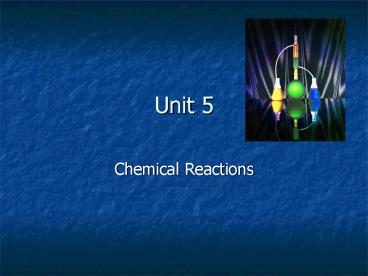Chemical Reactions - PowerPoint PPT Presentation
1 / 21
Title:
Chemical Reactions
Description:
Unit 5 Chemical Reactions Chemistry = Change Chemistry is all about change Explain in a sentence what may have chemically changed in each of the following ... – PowerPoint PPT presentation
Number of Views:254
Avg rating:3.0/5.0
Title: Chemical Reactions
1
Unit 5
- Chemical Reactions
2
Chemistry Change
- Chemistry is all about change
- Explain in a sentence what may have chemically
changed in each of the following pictures
3
- All CHEMICAL reactions start and end with
electrons - Metals
- Lose valence shell
- Become charged
- Types I and II
- Non-Metals
- Tend to gain electrons
- Become charged
- Dont always follow the rules (sometimes they
share etc.) - All chemical reactions are decided by ENERGY!
- 1st Law of Thermodynamics Energy cannot be
created or destroyed - 2nd Law of Thermodynamics Changes in nature tend
to decrease available energy (or release energy)
4
- We keep track of these changes by using chemical
equations
Here we have the chemical equation for the
formation of water. Notice the position of the
reactants and the products as well as the
coeficients.
5
Reactions and the 1st Law of Thermodynamics
- Notice on the previous picture that atoms are not
created or destroyed - This holds true with the 1st Law of TD
- This is the first rule in dealing with chemical
equations - RULE 1 all atoms present in the reactants must
also be accounted for in the products
6
Balancing Act
- When we follow Rule 1, we have balanced chemical
equations. - Consider the following reaction
- CH4 O2 ? CO2 H2O
- Is it balanced? How do we do it?
7
Balance the following reactions
- 1. K(s) H2O(l) ? H2(g) KOH
- 2. HgO(s) ? Hg(l) O2(g)
- 3. C(s) O2(g) ? CO2(g)
Besides just coefficients and chemicals, notice
the small letters indicating the STATE of the
chemical. l liquid aq aqueous (dissolved in
water) s solid g gas
8
Types of Reactions
- There are 5 types of reactions you need to know
- Synthesis
- Single replacement
- Double replacement
- Decomposition
- Combustion
9
Synthesis 2 into 1
- Synthesis or combination reactions form one new
compound from two reactants - H2 O2 ? H2O
- Balance this reaction
- Notice how two reactants COMBINE to form a new
product!
10
Synthesis is
11
Single Replacement
- In single replacement reactions, ONE element
reacts with ONE compound. - A new compound is formed
- One ion is released or left over without a partner
12
- Example
- Zn HCl ? H2 ZnCl2
- Balance this equation
- Notice only one anion is exchanged, only one
partner has switched
13
Double Replacement
- In double replacement reactions, a compound
reacts with another compound - Two new compounds are formed
- Both ions switch partners
14
- Example
- Pb(NO3)3 NaCl ? PbCl3(s) Na(NO3)(aq)
- Balance this reaction.
- What is PbCl3(s) called?
- Notice two new compounds are formed and both
ions switch partners
15
Decomposition 1 to 2
- In a decomposition reaction, 1 reactant breaks
apart (decomposes) into two products. - HgO(s) ? Hg (l) O2(g)
- Balance this reaction
- Notice there is 1 reactant! This is the key to
identifying decomposition reactions.
16
Combustion
- Hydrocarbon O2 ? CO2 H2O
- Hydro (H and possibly O) and Carbon (C)
- ALWAYS the same 2 products! All you have to do is
balance them!
17
(No Transcript)
18
Predict and Balance
- Composition/Synthesis Double Rep
- Na O2 ? AgNO3 K2SO4 ?
- Fe (iron 3) O2 ? Mg(OH)2 HCl ?
- Combustion
- CH4 O2 ?
- C6H12O6 O2 ?
- Single Rep
- KI Cl2 ?
- Cu (copper 2) AgNO3 ?
19
- C3H8 O2 ? CO2 H2O
- Balance this reaction
20
Acid Base
- Acid/base reactions follow the same rules as
single and double replacement reactions. - H acts as a metal cation, so it is replaced by a
metal cation
21
Oxidation/Reduction
- Know a couple examples
- Rust
- Corrosion
- Tarnish
- Electroplating
- Oxidation Number Charge on the ion































